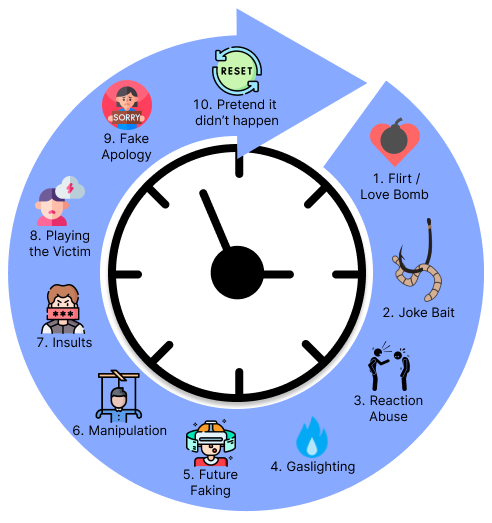Zero Trust, Zero Tolerance
2024-04-06

What is Zero Trust?
The zero trust security model describes an approach to implementing IT systems.
The main concept behind the zero trust security model is "never trust, always verify". This means that users and devices should not be trusted by default, even if they were previously verified.
What is Zero Tolerance?
A zero-tolerance policy is used to describe consequences for misconduct and rule-breaking.
The idea is that by enforcing consequences that show little tolerance for perpetrators, your company will create a safe workplace and productive environment where every employee knows exactly what's expected of them.
Personal Life
“When someone shows you who they are, believe them the first time.” ~ Maya Angelou
I use a zero trust and zero tolerance model in my personal life to protect myself from users and abusers. I'm upfront and clear about my boundaries and the consequences of crossing them. I watch people's behavior over time looking for patterns. Their true motivations and goals bleed through eventually. If they are purposefully rude or try to exploit me, they are immediately cut out of my life. No discussion, no second chances, that door is closed.
Culture
American culture is based on delusional prideful arrogance, greed, vanity, and competition for dominance. Americans are programmed to think that happiness comes from status, income, and owning material things. I do not agree with these ideas. I use a different yard stick to measure happiness.
It is better to refuse to play this game and become self-contained and self-sufficient than to engage with people who have accepted the current degenerate cultural programming.
Abuse Cycle
There is never any excuse for being disrespectful, rude, exploitative, or abusive.
Some people suffer from mental health issues, like Narcissistic personality disorder or NPD, that causes them to be abusive. For them, every interaction is an opportunity to use and/or abuse people.
They lack empathy, feel superior, crave power, control, and dominance.
People with these kinds of mental health issues will never change and cannot be reasoned with. The best solution is to spot them early and not allow them into your life. The second best solution is to identify people in your life who behave in abusive ways and cut them off completely.
Their goal is to establish themselves as the dominant authority and decision-maker in your life. They want you to fear upsetting them. Don’t ask questions, don’t think for yourself, or expect anything in return. Do as you're told and give them what they want.
What people with NPD want:
- Attention
- Validation
- Admiration
- Dominance
All of their tactics start with false assumptions, projection, and misdirection. It cannot be overstated that their main agenda is to abuse people. Some people say these behaviors come from immaturity, insecurity, or a fear-based need to control everyone around them. But their motivations don't matter. These behaviors are unacceptable and should never be tolerated.
It's important to keep in mind that people with NPD are permanently damaged, lack empathy, and get worse over time. If you find yourself in a situation with someone who has NPD the only choice is to cut them out of your life completely.
They will never learn from their mistakes, regret their words and actions, and will never change no matter the consequences. Given the opportunity, they will always attempt to control, use, and abuse everyone around them.
Here is a common pattern of abuse to look for:

- Flirt / Love Bomb = Insincere affectionate behavior designed to make the target feel loved and wanted so they lower their defenses.
- Joke Bait = Bait comments or jokes meant to get a negative emotional response that the instigator can react to as a victim.
- Reaction Abuse = The instigator gets upset and blames the responder. Because the instigator was only joking but the responder was being serious.
- Gaslighting = An attempt to trick the target into disbelieving their senses and perception of what is true.
- Future Faking = Pretending to offer something in the future in exchange for something now.
- Manipulation = Attempting to influence or control a target for personal gain at their expense.
- Insults (includes shaming) = Disrespectful, offensive, or derogatory words designed to hurt the feelings of the target in an accusatory way.
- Playing the Victim = Pretending to be a victim to gain attention, justify abuse, deflect accountability, or control a target.
- Fake Apology = An insincere apology designed to avoid responsibility and downplay their abusive behavior.
- Reset / Pretend it didn't happen = Refusing to acknowledge their abusive behavior. Or saying, "It's in the past. Let it go".
This cycle of abuse can spin fast over hours. Or it can spin slowly over years. It depends on the intensity and type of mental illness within the perpetrator. Knowing what users and abusers are after and their common tactics makes it easier to avoid them.
Rules of Conduct
One of the best ways to deter users and abusers from entering your life is to have a written "Rules of Conduct" document.
Every company has "Rules of Conduct". This is a list of unacceptable words and actions that are banned in the workplace.
I think every person has a list of words and actions they find unacceptable from others.
Writing down a list and making your boundaries clear at the beginning of relationships can prevent future misunderstandings and arguments. Sometimes, it can reveal conflicting values and incompatibilities before people waste time and effort getting invested. This applies to all kinds of relationships.
Below are my "Rules of Conduct" which are meant to protect me and create respect-based relationships.
Restrictions
The following restrictions apply to everyone who wants to interact with me.
- They must be at least 25 because I cannot stand immaturity.
- I don’t tolerate delusional people with mental health issues.
- I don’t tolerate disrespect, insults, sarcasm, or rude behavior.
- I don't tolerate people who attempt to control me.
- I don’t allow people around me who try to get something for nothing.
- I don’t listen to people complain about their problems.
- I don’t allow racism, sexism, or discrimination of any kind.
- I don’t smoke, drink, or use drugs. Or, allow people around me who do.
- I don’t allow pets around me because I have allergies.
- I don’t lend my things or loan money.
Not My Problem
I refuse to take on other people’s problems. Not my circus, not my monkeys. Being an adult means being self-contained and self-sufficient. Learn to troubleshoot, make rational decisions, and solve your problems. Or, be willing to pay someone to do it for you.
Divisive Topics
I refuse to waste time debating divisive topics that pull people apart.
- Religion = There is no bridge between Faith and Evidence.
- Morals and Ethics = Talk to a philosopher.
- Politics = Talk to a politician.
- Sports = I’m a nerd, not an athlete.
Discussion Topics
You might be wondering, “What can we talk about?” Here’s a list of topics I like talking about.
- Entrepreneurship or Small Business
- Graphic Design and UI Design
- Technology
- Linux
- Video Games
- YouTube
- TV Shows
- Movies
- Cartoons and Anime
- Food
Something For Nothing
I do not work for free. Those who feel entitled to use and abuse people as a way to get something for nothing. You are barking up the wrong tree when talking to me. Go kick rocks and pound sand. I will see through your mask and mind games and cut you out of my life. Don't waste my time.
Zero Trust, Zero Tolerance!